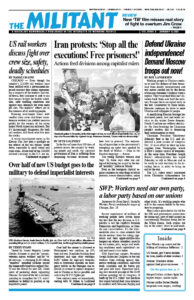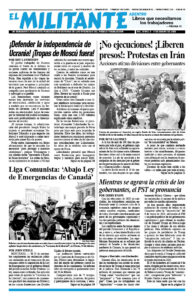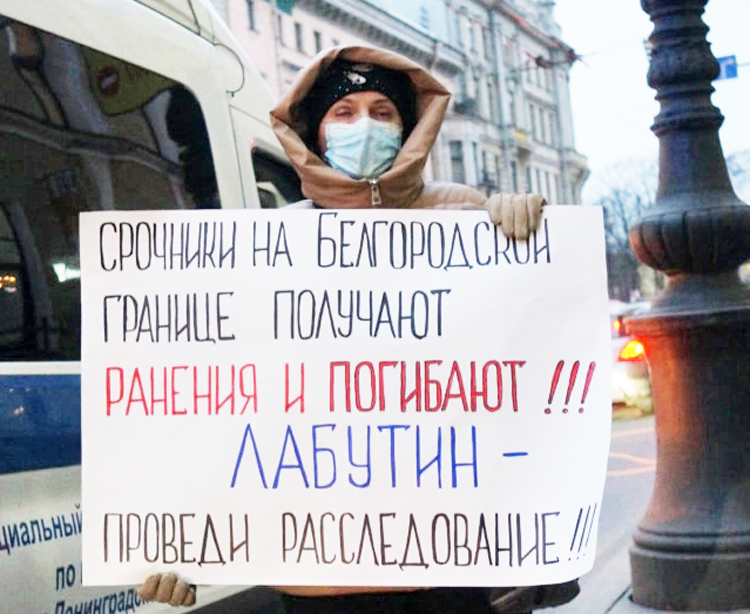Working people in Ukraine continue to lead the defense of their homeland from deadly bombardment and war moves carried out by the forces of Russian President Vladimir Putin’s regime. They’ve pushed Moscow’s invaders back from over half the territory Russian forces occupied early in the war. Undeterred by these losses, Moscow continues its drive to seize Ukraine and subjugate its people.
A monthslong Russian barrage has destroyed power, heat and water services as the winter freeze deepens. Nearly 9 million are without electricity. Far from breaking the Ukrainian people’s resolve, this is deepening their determination to resist.
Ukrainian President Volodymyr Zelensky flew to the U.S. and addressed a joint session of Congress Dec. 21 in an effort to shore up arms supplies from Washington, which is Kyiv’s largest source of weapons. At the same time, President Joseph Biden’s administration has urged Zelensky to talk to Moscow and to be ready to cede territory to the invading forces in order to bring an end to the war.
The U.S. rulers aren’t concerned about Ukrainian independence but about advancing their own imperialist interests. Putin’s war — the first full-scale conflict between two state powers on European soil since World War II — has caused capitalist rulers worldwide to reassess their position and alliances, and is fueling a new arms race.
Putin cynically uses this to repeat his false claims that the invasion was necessary “to protect our citizens,” because Washington and its allies are “pulling apart Russia, historical Russia.” In fact he aims to conquer Ukraine and regenerate the Russian Empire of the czars with himself at its head.
Putin’s call-up stirs opposition
Moscow’s September call-up of 300,000 conscripts has stirred deeper opposition to the war at home, especially among the wives and mothers of conscripts, and among soldiers who are speaking out.
“No one cared, the commanders weren’t giving any orders at all, plenty of them were drinking,” captured Russian soldier Yevgeny Chavelyuk told the press. He had received no training apart from firing a few target shots before his unit was deployed, without being told, into Ukraine. He was interviewed in a prisoner-of-war camp.
In response to declining support for Putin’s war, the Russian president Dec. 19 ordered the Federal Security Services, heirs of the KGB, to step up repression against “traitors, spies and saboteurs.”
Hundreds of Russian soldiers have joined Ukrainian forces to resist the invasion. Using the pseudonym “Caesar,” one ex-Russian soldier is helping defend the burnt ruins of Bakhmut in the eastern Donbas against a monthslong Russian onslaught. He told CNN, “When Ukraine is free, I will carry my sword to Russia to free it from tyranny.”
Hotline for Russian troops to give up
Thousands of others have called a Ukrainian hotline to find out how to surrender and defect.
This program instructs soldiers on how to follow small Ukrainian drones guiding them through the battlefield to Kyiv’s forces. Ukrainian artillery units also fire dummy shells — each containing 1,500 leaflets on how to surrender — that burst over Russian positions.
In neighboring Belarus, President Alexander Lukashenko has come under increasing pressure from Putin to do more to back Moscow’s invasion. Two years ago, working people joined mass protests against Lukashenko’s theft of presidential elections. He rode out the revolt only with Putin’s support. Despite his regime’s repression, he knows that popular opposition will erupt anew if Belarusian forces are committed to the war.
Lukashenko let Moscow use Belarus to transport troops and material to attack Kyiv. But working people took steps to impede the Russian troops and supplies, aiding Ukrainian efforts to repulse the invading columns. Now a court in Minsk, the capital of Belarus, is hearing cases against those involved in the actions.
In a closed-door hearing Dec. 22, Vitaliy Melnik, a member of an underground group known as the “rail partisans,” was sentenced to 16 years in jail on charges of “terrorism” and “insulting” Lukashenko. When arrested in April he was shot in both knees by Belarusian police. In the past few months, rail worker Sergei Konovalov was sentenced to 15 years imprisonment and Sergei Glebko to 11 years on similar charges.
Fellow partisans Dzmitry Ravich, Dzyanis Dikun and Aleh Malchanau, who could have faced the death penalty on charges of “state treason,” were given sentences of from 21 to 23 years Dec. 28. The three had also been shot and injured during their arrest.
Mariupol siege survivor refutes Putin
Russian Foreign Minister Sergei Lavrov repeated one of Moscow’s lies used to justify the war Dec. 26, claiming it’s needed for the “demilitarization and denazification” of Ukraine. As evidence for these slanders, the Kremlin often alleges the Ukrainian Azov brigade is a rightist outfit.
Illia Samoilenko, an Azov Regiment officer, refuted these claims during a mid-December speaking tour in Israel. Samoilenko survived the three-month siege of the Azovstal steelworks in Mariupol and then four months in solitary confinement in Moscow, before he was released in a POW swap.
Samoilenko told the Times of Israel that he joined the Azov Regiment in 2016, two years after its founding as a volunteer force to fight Moscow-led militias that had seized control of parts of the Donbas region of Ukraine.
Samoilenko acknowledged that some antisemitic rightists were initially part of the Maidan popular uprising that overturned the pro-Moscow regime of Viktor Yanukovych in 2014, as well as being members of the Azov group. Many quit the regiment a year later.
“The rest of the right-wing radicals,” Vyacheslav Lykhachov, a Russian-born Israeli researcher, told the Times, “were deliberately cleaned out by the new commandant of the regiment in 2017.” Jewish Ukrainians were always brigade members, Samoilenko said, “but not in great numbers because a lot of people were frightened by the Russian propaganda.”
On his return from captivity in Russia, Samoilenko said he had been struck by Ukraine’s transformation into “a different country where we understood our potential, how strong we are when we’re united.”


